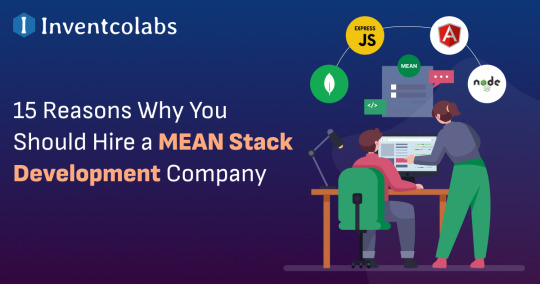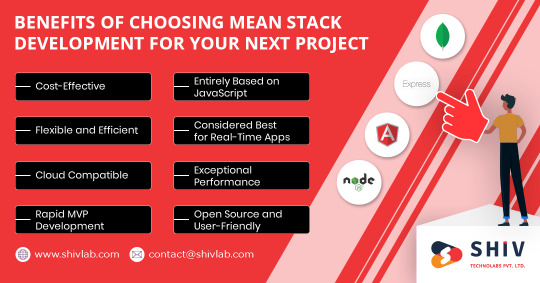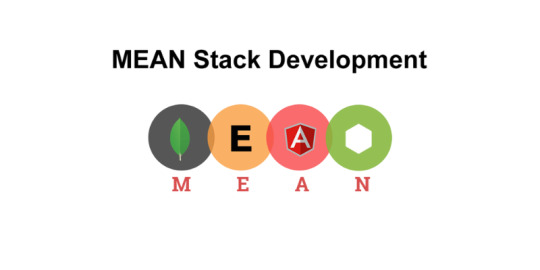#meanstackdeveloper
Explore tagged Tumblr posts
Text

Master MEAN Stack Development with Expert Training in Kharadi
Kickstart your career with the best MEAN Stack Development Course in Kharadi – the leading IT training hub in Pune. Our course is designed to help you become a professional MEAN Stack Developer by mastering MongoDB, Express.js, Angular, and Node.js. Whether you're a student, fresher, or working professional, this MEAN Stack Development Course in Kharadi offers practical training, live projects, and expert mentorship to make you job-ready. Learn to build powerful web applications from scratch and gain hands-on experience that top IT companies look for. Join the most trusted MEAN Stack training institute in Kharadi and take a step toward your dream IT career. Enroll now in our MEAN Stack Development Course In Kharadi and unlock exciting job opportunities in the booming tech industry!
0 notes
Text

The world of web development is rapidly evolving, and having expertise in cutting-edge technologies is crucial for a successful career. One of the most in-demand skills in the development world today is MEAN Stack. If you’re looking to become a full-stack developer or enhance your web development capabilities, enrolling in a MEAN Stack course in Gurgaon at APTRON Gurgaon is the perfect step. This course is tailored to give you hands-on experience and mastery over the entire stack of technologies used in modern web applications.
#MEANStackCourse#WebDevelopmentTraining#MEANStackDeveloper#FullStackDevelopment#LearnMEANStack#APTRONGurgaon#ITTrainingGurgaon#CareerInWebDevelopment#WebDevelopmentGurgaon
0 notes
Text

🚀 We Are Hiring - Java Full Stack Developer! 🚀
Location: Madurai Experience: 5+ Years Salary: 3.5 - 7 LPA
🔹 Key Skills: ✅ Java Spring Boot ✅ AWS (CloudFormation, Lambda) ✅ REST API Testing – Python, Postman, etc. ✅ Microservices Architecture ✅ SQL/NoSQL Databases (MySQL, DynamoDB) ✅ Version Control (Git, BitBucket) ✅ AWS API Gateway, ECS, Docker Containers ✅ CI/CD Automation (Jenkins, Bamboo, Git, etc.) ✅ Frontend - Angular, React.js, Express.js ✅ SQL to Java Tier Design & Implementation
💼 If you’re passionate about coding, cloud technologies, and API development, join our dynamic team!
📩 Apply Now – www.amigoways.com/careers/senior-java-full-stack-developer
#hiring#fullstackdeveloper#javadeveloper#hiringjavadeveloper#hiringjavadev#needjob#itjobs#react#reactfrontenddeveloper#frontenddeveloper#developer#requirement#amigoways#fullstack#meanstack#meanstackdeveloper#meanstackjobs#fulltimejob#permanentjob#Maduraijobs#fullstackjobs#reactjsjobs#nodejsjobs#angularjobs#SoftwareCompany#Madurai#ITCompany#softwaresolutioncompanyinmadurai#itcompanyinmadurai#softwarecompanyinmadurai
0 notes
Text
Discover The Top Reasons to Hire MEAN Stack Development Company
Unlock the potential of your web projects by partnering with a MEAN Stack Development Company. Modern technologies are used by MEAN Stack Development Companies to improve your online presence and stimulate business expansion, from simplified coding to smooth integration.

#meanstackdeveloper#meanstack#innovations#meanstackappdevelopmentcompany#DigitalTransformation#fullstackdevelopment#webdevelopment#mobileappdevelopmentcompany
0 notes
Text
0 notes
Text
Powering Modern Web Applications: Discover the Expertise of Softgrid Computers in MEAN Development
In today's fast-paced digital world, web applications are the backbone of business across all industries. That's why it's important to find technology to build useful, Dynamic applications. The MEAN stack, short for MongoDB, Express.js, Angular, and Node.js, has become a popular choice among developers due to its versatility, flexibility, and ability to manage front- and back-end development. One of the pioneers supporting the potential of the MEAN group is Softgrid Computers, a development company known for its innovative solutions and expertise in modern web development.
MEAN Stack Revealed
Before moving on to the Softgrid computing experience, let's take a look at the components of the MEAN stack and why, together, they are a strong choice for web development.
MongoDB: As a NoSQL database, MongoDB offers flexibility in handling unstructured or semi-structured data. Designed for scalability and high performance, it is ideal for applications with rapidly changing data.
Express.js: Express.js is a web application framework. Express.js simplifies the process of building powerful and scalable web applications. It provides tools and functionality to perform efficient, centralised, and server-side logic.
Angular: Developed and maintained by Google, Angular is a powerful framework that allows developers to build integrated single-page applications (SPAs). Relying on data binding and injection can lead to better development and testing.
Node.js: Node.js is an operating system that allows JavaScript to run on the server side. Its event-driven, non-blocking architecture ensures consistent, real-time execution.
Softgrid Computers: Pioneers of the MEAN Stack
Softgrid Computers has established itself in the competitive web design world by harnessing the power of the MEAN stack. With a team of talented developers, UI/UX designers, and project managers, the company provides the best solutions to clients around the world.
Seamless Integration Solution
One of Softgrid Computers' main strengths is the ability to seamlessly integrate MEAN group components to create powerful and dynamic web applications. The company's developers are well aware of how to increase the power of each product to ensure good communication between the front-end and the back-end.
Scalability and Performance
Softgrid Computers Learn the importance of scalability and performance in modern web applications. The MEAN cluster's architecture natively supports horizontal scaling, allowing applications to handle increased traffic and data without impacting performance.
Real-time applications
Real-time applications, such as chat applications and collaboration tools, require instant data updates. The event-driven architecture of Node.js combined with the powerful capabilities of Angular enables Softgrid Computers to build real-time applications that provide a great user experience.
Customization and Innovation
Every customer has unique needs, and Softgrid Computers specialises in customising MEAN cluster solutions to meet those needs. The company's developers work with customers to understand their goals and create custom apps that meet their business goals.
Adopt Best Practises
Softgrid Computers follows the latest trends and best practises in the MEAN Stack development group. By using secure authentication and authorization mechanisms to optimise database queries, the company ensures that its application is not only fully functional but also secure and efficient.
User-Focused Approach
User experience is the foundation of any successful application. UI/UX designers at Softgrid Computers work closely with developers to create intuitive and visual experiences that increase user engagement and satisfaction.
Support and Regular Maintenance
The journey does not end with the submission of the application. Softgrid Computers provides ongoing support and maintenance to ensure applications continue to run efficiently, adapt to changing needs, and remain secure from emerging threats.
The Way Ahead
As the digital space continues to evolve, Softgrid Computers continues to push the boundaries of what is possible with the MEAN group. The company's commitment to innovation, combined with deep expertise, makes it a trusted choice for businesses looking to build powerful web applications to support growth and success.
All in all, Softgrid Computers' mastery of the MEAN group has made it a mark of quality in the modern web application development world.
Leveraging the power of MongoDB, Express.js, Angular, and Node.js, the company creates medium- and new-use solutions that are not only efficient and scalable but also human-friendly. As businesses across industries continue to rely on web applications to thrive in the digital age, partnering with an expert team of MEAN Stack developers like Softgrid Computers can make all the difference.
0 notes
Text
Mean Stack Development Company
Softgrid Computers is a leading Mean Stack development company, specializing in creating cutting-edge web applications and solutions. With a talented team of Mean Stack experts, we leverage the power of MongoDB, Express.js, Angular, and Node.js to build robust and scalable applications tailored to meet our clients' unique business needs. Our holistic approach to software development ensures seamless integration, high performance, and a delightful user experience. Whether you require enterprise-grade solutions or startup-friendly applications, Softgrid Computers is your trusted partner in delivering reliable Mean Stack development services.
0 notes
Text
Benefits of Choosing MEAN Stack Development For Your Next Project

Unlock the advantages of MEAN Stack development for your next project. Benefit from a robust combination of MongoDB, Express.js, Angular, and Node.js that offers seamless integration, scalability, and real-time capabilities. Enjoy efficient development, code reusability, and faster time-to-market, making MEAN Stack an ideal choice for modern web applications. Discover more at https://shivlab.com/mean-stack-development/
#meanstack#meanstackdeveloper#meanstackdevelopment#webdevelopment#webdevelopmentcompany#webdevelopmentservice
0 notes
Text
Build powerful and dynamic web applications with MEAN Stack Development

Transform your web application with MEAN Stack Development - the ultimate solution for scalability and high performance!
#MEANStack#webdevelopment#javascript#nodejs#angular#mongodb#expressjs#fullstackdeveloper#webapp#webdeveloper#webdesign#programming#coding#tech#softwaredevelopment#appdevelopment#webdev#development#webapplication#meanstackdeveloper
0 notes
Link
Do you want to know which tech stack to use for your next project, MEAN or MERN? Our latest blog post provides a detailed comparison of these two popular tech stacks, highlighting their advantages and disadvantages, components, and recommended project types. Stay ahead of the curve and make an informed decision by reading our blog post now!
#webdevelopmentsupport#webdevelopmenttips#technologysolutions#technologynews#tech#meanstackdeveloper#mernstackdeveloper#mern#mean#fullstackengineer#fullstackdeveloper#fullstackwebdevelopment#fullstackdevelopment#fullstack#webcodegenie#webdevelopment#mernstack#meanstack
1 note
·
View note
Text
MERN and MEAN Stacks – Tools for Modern Web Development
Read this blog to know the differences between Mern and Mean Stack and what makes them best MERN and MEAN Stacks – Tools for Modern Web Development.
0 notes
Text
If you're looking to build a career in full-stack web development, mastering the MEAN stack is a powerful choice. The MEAN stack comprises MongoDB, Express.js, Angular, and Node.js, forming a robust framework for developing dynamic and scalable web applications. For those based in Gurgaon or nearby areas, APTRON offers a comprehensive MEAN Stack course designed to equip you with hands-on skills, industry insights, and the knowledge needed to excel in this rapidly growing field.
#MEANStackCourse#WebDevelopmentTraining#MEANStackDeveloper#FullStackDevelopment#LearnMEANStack#APTRONGurgaon#ITTrainingGurgaon#CareerInWebDevelopment#WebDevelopmentGurgaon
0 notes
Text

🚀 Exciting Opportunity! We're Hiring Full-Stack Developers in Madurai! 🚀
Join us at @amigoways and be a part of a growing team. We're looking for 5 freshers with 0-1 year experience to join our full-time development team!
🔑 Key Responsibilities: ✔️ Design and develop innovative web applications that enhance user experience ✔️ Collaborate with team members in coding, debugging, and problem-solving ✔️ Participate in code reviews and contribute to project planning ✔️ Stay updated with new technologies and industry trends
🎓 Skills & Qualifications: ✔ Bachelor’s degree in Computer Science or a related field ✔ Proficiency in HTML, CSS, JavaScript, React, Node.js, Express.js, and Linux ✔ Familiarity with MongoDB for database management ✔ Strong problem-solving and communication skills
💡 Preferred: ✔️ Prior internships or project experience in web development ✔️ Familiarity with Git and version control systems
📧 Apply Now: www.amigoways.com/careers/full-stack-developers
#Hiring#FullStackDeveloper#MaduraiJobs#FreshersWelcome#WebDevelopment#AmigowaysTechnologies#CareerOpportunity#hiring#hiringdeveloper#hiringdev#needjob#itjobs#react#reactfrontenddeveloper#frontenddeveloper#developer#requirement#amigoways#fullstack#meanstack#meanstackdeveloper#meanstackjobs#fulltimejob#permanentjob#Maduraijobs#fullstackjobs#reactjsjobs#nodejsjobs#angularjobs#SoftwareCompany
0 notes
Text
Partner with the Leading MEAN Stack Development Company for Scalable Web Solutions
Partner with the leading MEAN Stack Development Company to build scalable, secure, and high-performance web solutions tailored to your business needs.
#MEANStackDevelopment#MEANStackDevelopmentCompany#MEANStackServices#MEANStackWebDevelopment#CustomMEANStackSolutions#ScalableWebDevelopment#FullStackJavaScriptDevelopment#MEANStackDevelopers#EnterpriseWebSolutions#BestMEANStackCompany
0 notes
Text
Top Strategies to Hire Expert MEAN Stack Developers
Hire dedicated MEAN developers to build scalable, high-performing web applications. Find expert MEAN stack developers in India for your next project.
Introduction
In today's digital landscape, businesses need robust and scalable web applications to stay ahead of the competition. The MEAN stack (MongoDB, Express.js, Angular, and Node.js) is a popular technology stack that provides end-to-end JavaScript-based development. To ensure your project’s success, it's crucial to hire dedicated MEAN developers who can build high-performing applications tailored to your needs.

This guide will help you understand the best strategies to hire MEAN stack developers, the benefits of hiring expert developers, and how to find the right talent for your project.
Why Hire MEAN Stack Developers?
Hiring dedicated MEAN stack developers comes with several advantages:
Full-Stack Expertise: MEAN developers handle both frontend and backend development seamlessly.
Cost-Effectiveness: MEAN stack simplifies the development process, reducing overall project costs.
Scalability & Flexibility: Ideal for startups and enterprises requiring scalable solutions.
Faster Development: JavaScript-based stack enables rapid development and deployment.
Strategies to Hire Dedicated MEAN Developers
1. Define Your Project Requirements
Before starting the hiring process, outline your project’s needs, such as:
Type of application (e-commerce, SaaS, enterprise solution, etc.)
Features and functionalities required
Budget and timeline
2. Look for Experienced MEAN Stack Developers
When hiring, focus on candidates with experience in:
MongoDB: NoSQL database management
Express.js: Backend framework for building APIs
Angular: Frontend framework for creating interactive UI
Node.js: Server-side runtime environment
3. Consider Hiring from MEAN Stack Development Companies
Partnering with a MEAN stack development company in India ensures access to skilled professionals who follow industry best practices.
4. Assess Technical Skills
Evaluate candidates based on:
Coding Proficiency: Check knowledge of JavaScript, TypeScript, and frameworks.
API Development: Understanding of RESTful APIs and microservices.
Database Management: Expertise in MongoDB and data modeling.
Version Control: Familiarity with GitHub/GitLab.
Problem-Solving Abilities: Ability to troubleshoot and debug effectively.
5. Check Previous Work & Portfolio
Ask candidates to share:
Past MEAN stack projects
GitHub repositories
Live application links
6. Conduct Technical Interviews
Prepare interview questions on:
MEAN stack components
JavaScript frameworks and best practices
Handling real-world scenarios and performance optimization
7. Choose the Right Hiring Model
Depending on your project needs, you can:
Hire dedicated MEAN stack developers for long-term projects.
Hire MEAN stack programmers in India on a contractual basis.
Outsource to MEAN stack development services India for flexible team scaling.
8. Evaluate Soft Skills
Apart from technical expertise, assess candidates for:
Communication Skills – Essential for team collaboration.
Problem-Solving Ability – Helps in efficient project execution.
Adaptability – Willingness to learn and upgrade skills.
9. Use Job Portals & Freelance Platforms
Post job listings on:
LinkedIn
Upwork
Toptal
Indeed
10. Competitive Salary & Benefits
To attract top talent, offer:
Market-competitive salaries
Remote work flexibility
Learning and development opportunities
FAQs About Hiring MEAN Stack Developers
Q1. Why should I hire MEAN stack developers instead of separate frontend and backend developers? A1. MEAN stack developers handle both frontend and backend development, reducing project complexity and costs.
Q2. How much does it cost to hire MEAN stack developers in India? A2. Hiring costs vary based on experience, location, and project scope, typically ranging from $15 to $50 per hour.
Q3. Can I hire MEAN developers on a part-time basis? A3. Yes, you can hire dedicated MEAN stack developers on a part-time, full-time, or contractual basis.
Q4. How do I verify a MEAN stack developer’s expertise? A4. Assess their technical skills through coding tests, interviews, and reviewing past projects.
Q5. What industries benefit from MEAN stack development? A5. Industries such as e-commerce, healthcare, fintech, and SaaS platforms benefit from MEAN stack applications.
Conclusion
Finding the right MEAN stack developers for hire is essential for building scalable and efficient applications. Whether you hire dedicated MEAN stack developers from India or choose a development company, ensure they have the right skills, experience, and problem-solving abilities. Follow these hiring strategies to secure top MEAN stack talent for your project’s success.
Call to Action
Looking to hire MEAN stack developers in India? Contact us today to get started with top-tier MEAN stack talent!
Referral Link: Discover jobs more easily with a jobformautomator AI extension.
#HireMEANDevelopers#MEANStackDevelopers#HireDedicatedMEANDevelopers#MEANStackDevelopment#HireMEANStackDevelopersIndia#MEANStackProgramming#HireTopMEANDevelopers#MEANStackDevelopmentCompany#FullStackDevelopers#HireMEANStackExperts#WebDevelopment#NodejsDevelopers#MongoDB#Angular#ExpressJS#HireMEANProgrammers#DedicatedMEANDevelopers#HireMEANStackDeveloperIndia
0 notes
Text
The Benefits of Using MEAN Stack for Scalable Web Development

Mean Stack development has evolved significantly in recent years, and with the increasing demand for dynamic, high-performance, and scalable applications, selecting the right technology stack has become more critical than ever. Among the various technology stacks available, the MEAN stack has emerged as a popular choice for building scalable and high-performance web applications.
In this blog post, we'll dive deep into the MEAN stack—comprising MongoDB, Express.js, Angular, and Node.js—and explore its numerous benefits, particularly in scalable web development.
1. Understanding the MEAN Stack
Before we delve into the benefits, let's take a closer look at the individual components of the MEAN stack:
MongoDB: A NoSQL database that stores data in flexible, JSON-like documents, making it an ideal solution for handling large amounts of unstructured or semi-structured data. MongoDB is designed to scale horizontally, which is essential for large applications requiring high availability and quick data access.
Express.js: A lightweight web application framework for Node.js, Express simplifies the server-side development of web applications by offering a robust set of features for building both simple and complex applications. It acts as the middle layer between the database and the front-end.
Angular: A front-end web application framework developed by Google. Angular provides developers with a powerful set of tools to build dynamic, single-page applications (SPAs) with a rich user interface. Its two-way data binding feature and component-based architecture make it ideal for building scalable, high-performance front-end applications.
Node.js: A server-side JavaScript runtime environment built on Chrome’s V8 JavaScript engine. Node.js uses an event-driven, non-blocking I/O model, making it highly efficient and suitable for applications that require scalability and performance, such as real-time applications and APIs.
Together, these four technologies form the MEAN stack, which allows developers to build end-to-end JavaScript-based applications.
2. Scalability with MongoDB
Scalability is often one of the primary concerns when developing web applications. As your application grows in terms of user base, data volume, and traffic, your database must be able to scale efficiently.
MongoDB, as a NoSQL database, is designed to handle massive amounts of unstructured and semi-structured data, which is common in modern web applications. Unlike relational databases that rely on tables and rows, MongoDB stores data in JSON-like documents, allowing for more flexibility in how data is stored and queried.
Key scalability features of MongoDB include:
Horizontal Scaling: MongoDB is designed for horizontal scaling, meaning it can distribute data across multiple machines using a process called sharding. This allows MongoDB to handle massive datasets and high-throughput applications without performance degradation.
Replication: MongoDB uses replica sets, which allow data to be replicated across multiple servers. This enhances data availability and ensures that your application remains operational even in case of server failures, contributing to overall scalability.
Flexibility and Performance: MongoDB's flexible schema allows developers to quickly adapt to changing requirements and scale applications without worrying about database schema changes. This performance efficiency, coupled with scalability, makes MongoDB an ideal choice for modern web applications.
3. High Performance with Node.js
Node.js is built on an event-driven, non-blocking I/O model, which makes it extremely lightweight and efficient. This architecture is well-suited for building scalable applications that require high performance, such as real-time chat applications, social networks, and online gaming platforms.
Here’s how Node.js contributes to the scalability of web applications:
Non-blocking I/O: Node.js processes requests asynchronously, meaning it doesn’t block or wait for one request to complete before moving on to the next. This enables Node.js to handle many requests simultaneously without becoming slow or unresponsive.
Event-Driven Architecture: The event-driven nature of Node.js means that it can handle a large number of concurrent requests with minimal resource consumption. This makes Node.js a fantastic choice for building applications that need to scale quickly and handle multiple simultaneous users.
Single-Threaded Model: Unlike traditional server architectures that use multiple threads to handle incoming requests, Node.js operates on a single thread using an event loop to manage concurrent requests. This design allows for more efficient use of system resources, making it well-suited for applications with high concurrency requirements.
NPM Ecosystem: Node.js also benefits from a vast ecosystem of open-source libraries and modules available through the Node Package Manager (NPM). These libraries make it easier for developers to integrate various functionalities, reducing development time and allowing for faster scalability.
4. Real-Time Applications with Angular
In today’s competitive landscape, businesses require applications that can deliver real-time user interactions. Angular, as a front-end framework, plays a pivotal role in ensuring that web applications provide a smooth, dynamic, and engaging user experience.
Key benefits of Angular for real-time applications:
Two-Way Data Binding: One of Angular’s standout features is its two-way data binding, which ensures that any changes made in the user interface are automatically reflected in the data model, and vice versa. This reduces the amount of boilerplate code developers need to write, improving development speed and performance.
Component-Based Architecture: Angular uses a component-based architecture, where the user interface is broken down into reusable and self-contained components. This structure makes it easier to scale the application as new features can be added by simply creating new components.
Dependency Injection: Angular’s built-in dependency injection system makes it easier to manage and scale large applications by handling the creation and management of services and dependencies. This improves performance and scalability by ensuring that resources are allocated efficiently.
Optimized for Single-Page Applications (SPAs): Angular is optimized for building SPAs, where the entire application is loaded as a single page and dynamically updates based on user interactions. SPAs are more scalable because they load faster and provide a more seamless user experience compared to traditional multi-page applications.
5. Full JavaScript Development Environment
One of the most significant advantages of the MEAN stack is that it provides a full-stack JavaScript development environment. This means that both the front-end and back-end of the application are written in JavaScript, allowing for a more streamlined development process.
Here are the key benefits of a full JavaScript environment:
Unified Language: Developers can use a single programming language (JavaScript) across both the client and server sides, which reduces the cognitive load when switching between different languages. This uniformity also makes it easier to share code between the front-end and back-end, improving productivity and reducing redundancy.
Code Reusability: JavaScript code written for the back-end (Node.js) can be reused on the front-end (Angular), which increases efficiency and speeds up the development cycle.
Faster Development Cycle: Since both sides of the application are developed in the same language, development time is reduced. This leads to faster deployment and quicker iteration, essential for scalable projects that need to evolve rapidly.
Lower Learning Curve: Developers who are already familiar with JavaScript can quickly transition to full-stack development using the MEAN stack, reducing the time spent learning multiple programming languages.
6. Seamless Integration and Maintenance
The MEAN stack is designed to work together seamlessly, making it easier for developers to integrate the various components of the stack. The result is a cohesive architecture that simplifies both the development and maintenance processes.
Here’s how MEAN stack facilitates integration and maintenance:
Consistent Architecture: Since all components of the stack (MongoDB, Express.js, Angular, and Node.js) use JavaScript, the application architecture remains consistent. This reduces the complexity of the codebase and makes maintenance easier.
Efficient Data Flow: MEAN stack’s full-stack approach ensures a smooth flow of data between the front-end, server-side, and database. Data is passed in JSON format, which is easy to parse and manage across the entire stack.
Faster Bug Fixes and Updates: With a single technology stack, developers can quickly identify and fix issues, implement updates, and maintain the application without dealing with language mismatches or integration problems.
7. Community Support and Resources
Another major benefit of the MEAN stack is its strong community support. Each of the technologies—MongoDB, Express.js, Angular, and Node.js—has a large and active community of developers who continuously contribute to the ecosystem by building tools, libraries, and documentation.
The community support provides several advantages:
Open Source and Free Tools: All components of the MEAN stack are open-source, which means developers can leverage free tools, libraries, and resources to enhance their applications.
Continuous Improvements: The constant updates and improvements from the community ensure that the MEAN stack remains up-to-date with the latest trends and security patches.
Large Knowledge Base: With a large community, developers can easily find tutorials, forums, and other learning resources to help solve problems and improve their skills.
8. Cost Efficiency for Scalable Development
For businesses, scalability isn’t just about performance; it’s also about being cost-effective. The MEAN stack offers a cost-efficient way to build scalable applications for several reasons:
Open-Source Technologies: All the components of the MEAN stack are open-source, meaning there are no licensing fees associated with using these technologies. This can significantly reduce development costs.
Faster Development: The ability to use a single language across the entire stack reduces development time and costs, making it a more affordable solution for building scalable applications.
Reduced Infrastructure Costs: MongoDB’s horizontal scaling and Node.js’s efficient resource usage reduce the need for high-powered servers, which can further lower infrastructure costs.
9. Case Studies and Success Stories
Several successful companies and startups have leveraged the MEAN stack to build scalable, high-performance web applications. These case studies demonstrate the real-world benefits of using the MEAN stack for scalability:
Uber: Uber uses Node.js in its tech stack to handle millions of real-time requests from users. The non-blocking I/O model of Node.js allows Uber to process a large number of requests with minimal latency.
LinkedIn: LinkedIn migrated to Node.js for its mobile app's back-end, achieving faster performance and better scalability.
Netflix: Netflix uses Node.js for server-side rendering and delivering high-performance content to users worldwide.
Conclusion
The MEAN stack development offers a powerful combination of technologies that are perfect for building scalable, high-performance web applications. With its focus on flexibility, efficiency, and cost-effectiveness, the MEAN stack is an ideal choice for businesses looking to develop applications that can grow and scale over time. Whether you're developing real-time applications, APIs, or dynamic single-page apps, the MEAN stack provides all the tools you need to succeed in today’s fast-paced digital world.
By embracing the MEAN stack, businesses can ensure they are equipped to handle the demands of modern web development, while also benefiting from faster development cycles, lower costs, and a highly scalable infrastructure.
0 notes